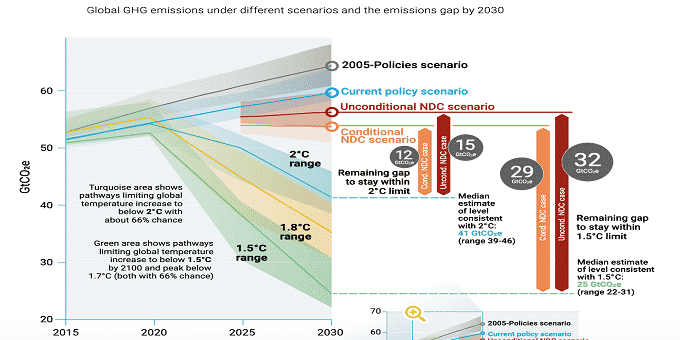On November 28, 2019 the United Nations Environment Programme (UNEP) report titled “Emissions Gap Report 2019” warns the world to reduce greenhouse gas emissions by 7.6% each year between 2020 and 2030 to achieve the 1.5°C temperature goal of the Paris Agreement by 2030. Despite the commitments under the Paris Agreement temperatures are still expected to rise by 3.2°C, bringing even wider-ranging and more destructive climate impacts.

The Paris Agreement: It is a 2015 landmark climate accord, that pledges to keep global warming “well below” 2 °C (degree Celsius) above pre-industrial levels and strive for a lower limit of 1.5 degrees Celsius. The Intergovernmental Panel on Climate Change (IPCC) announced that if the world fails to limit global warming to below 1.5°C, frequency and intensity of climate impact would increase.
Report:
i.India’s work in reducing GHG: India, along with China, Mexico, Russia and Turkey are projected to meet their targets with current policies. India, Russia and Turkey are expected to ‘over perform’ their targets by around 15%.
- India had made 3 promises at the 21st Conference of Parties meeting in Paris, France in December 2015. They were to lower emission intensity of GDP (Gross Domestic Product), to create more forests to absorb 2.5 billion to 3 billion tonnes of CO2 from the atmosphere and 40% of installed capacity for electricity generation based on non-fossil fuels.
ii.In 2018, 55.3 gigatonnes of Carbon-dioxide (CO2) equivalent of greenhouse gases (GHG) were emitted globally. In 2017 the emission was 54 gigatonnes.
iii.Fossil fuel burning: The main reason for increase in CO2 emissions was burning of fossil fuels. Fossil fuel burning dominate GHG emissions and led to grow by 2% in 2018 reaching a record 37.5 gigatonnes per year.
iv.Inorder to stay under 2°C, by the year 2030, emissions would need to be 25%(15 gigatonnes of CO2) lower than in 2018. For a 1.5°C-consistent pathway, the reduction needs to be even deeper 55%(32 gigatonnes) below 2018 levels.
v.Underachievement by key economies: Key economic countries like Australia, Brazil, Canada, Japan, the Republic of Korea, South Africa and the United States of America(USA) continue to underachieve on the targets which they set for themselves in Paris in 2015, known as “Nationally Determined Contributions” (NDCs).
vi.G20 nations: G20(Group of 20) nations account for 78% of all emissions, but 15 G20 members have not committed to a timeline for net-zero emissions of GHG.
About United Nations Environment Programme:
Formation- 5 June 1972.
Headquarters- Nairobi, Kenya.
Director- Inger Andersen.




